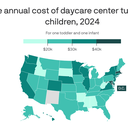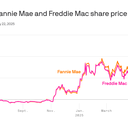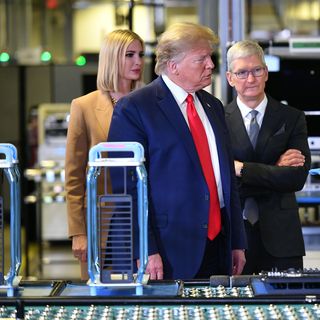AI race goes supersonic in milestone-packed week
The AI industry unleashed a torrent of major announcements this week, accelerating the race to control how humans search, create and ultimately integrate AI into the fabric of everyday life.
Why it matters: The breakneck pace of innovation — paired with the sky-high ambitions of tech's capitalist titans — is reshaping the AI landscape faster than regulators or the public can fully comprehend.
1. OpenAI: The ChatGPT maker joined forces with legendary Apple designer Jony Ive, acquiring his startup io in a $6.5 billion deal to create a new generation of hardware devices.
- Glitzy promotional materials framed the deal as a historic marriage of Silicon Valley royalty, with CEO Sam Altman predicting a tech revolution unlike anything the world has ever seen.
- Privately, Altman told staff that he and Ive aim to ship 100 million pocket-sized AI "companions" starting late next year — a moonshot he claimed could create $1 trillion in value for OpenAI, the WSJ reports.
- A day later, OpenAI announced it would build a massive Stargate data center in Abu Dhabi in partnership with the UAE government, Oracle, Nvidia, Cisco, SoftBank, and Emirati AI firm G42.
2. Google: The tech giant made 100 announcements at its I/O developer conference — chief among them, a new "AI Mode" chatbot that CEO Sundar Pichai described as a "total reimagining of search."
- For Google, it's a necessary but thorny shift — one that will force the company to replicate its lucrative ad business in an experience that bears little resemblance to the current web.
- Google also unveiled Veo 3, a stunningly advanced video model that lit the internet on fire — amazing and horrifying users with AI-generated clips nearly indistinguishable from human-made content.
3. Anthropic: The startup hosted its own developer conferenec and debuted the first models in its latest Claude 4 series — including one, Claude 4 Opus, that it says is the world's best at coding.
- Anthropic said Claude 4 Opus can perform thousands of steps over hours of work without losing focus — and decided it's so powerful that researchers had to institute new safety controls.
- While that determination had to do with its potential to create nuclear and biological weaponry, researchers also found that Claude 4 Opus can conceal intentions and take actions to preserve its own existence — including by blackmailing its engineers.
4. Apple: As the tech world obsessed over Ive's new partnership with OpenAI, Bloomberg reported that the notoriously secretive Apple intends to release smart AI-enabled glasses before the end of 2026.
- The rumored device — a direct rival to Meta's popular Ray-Bans and forthcoming specs from Google — would include a camera, microphones, and a speaker, effectively turning an Apple-designed wearable into an everyday AI assistant.
- It's a major bet for the dominant consumer tech giant, which has struggled to crack into the generative AI space after years of setbacks in revamping Siri into a competitive voice assistant.
The bottom line: This week's frenzy was as much a competition to steal headlines — and fight for the hearts and minds of developers — as it was a major leap toward defining how AI will shape the next decade.

/2025/05/23/1748022534479.gif)

























/2025/05/22/1747946866851.gif)












